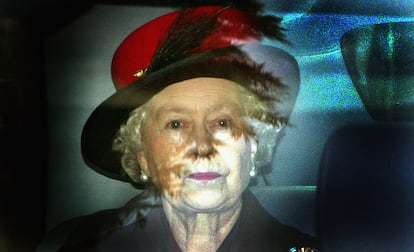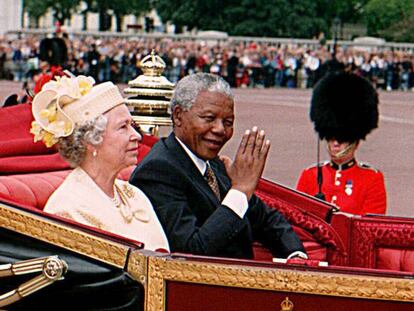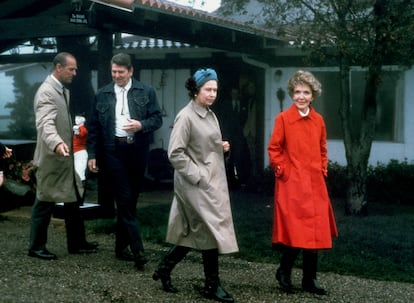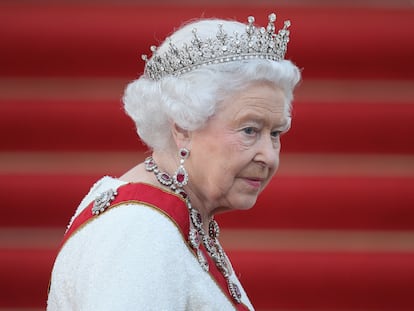How to lose an empire without losing one’s composure
Elizabeth II was able to fill the void left by the dismantling of the colonial power of the United Kingdom

No country has changed over the last 100 years as much as the United Kingdom. What once was the greatest empire and a considerable industrial power is something else today, something difficult to define, whose structure was built over time around the personality of a supposedly impersonal woman. Elizabeth Alexandra Mary Windsor attended the dismantling of her legacy without flinching and, somehow, knew how to fill the void with her presence. Without Elizabeth II, the British monarchy will be something else. And so will the world.
On June 2, 1953, when she was crowned, the cards were already on the table. India’s independence fight had been bloody and messy. The British withdrawal from Palestine in 1948 had given rise to a conflict that remains unsettled to this day. For the first time in centuries, the new monarch was not presented with the “imperial crown” at the coronation ceremony, but with the vague title of “Head of the Commonwealth.” No one quite knew what the Commonwealth consisted of. Only one person was able to find out and make sense of that international ghost. That person, Elizabeth II, is now gone.
The list of amputations to which the old empire was subjected after the coronation is impressive. Ghana and the Federation of Malaya (Malaysia) gained their independence in 1957. Nigeria in 1960. Sierra Leone and Tanganyika (Tanzania) in 1961. Uganda, Jamaica and Trinidad and Tobago in 1962. Kenya and Zanzibar in 1963. Malta, in 1964. Gambia, 1965. Bechuanaland (Botswana), Basutoland (Lesotho) and Barbados in 1966. Mauritius, 1968. Seychelles, 1976. Hong Kong, 1997. However, something remained after so many farewells: a rare loyalty to Elizabeth II. Not to the monarchy; much less to the United Kingdom. To her.
Philip of Edinburgh once said that his wife was not practicing as a queen in the Commonwealth, but as a “psychotherapist.” That definition is accurate. Elizabeth II had to manage a network of new republics and local monarchies, abundant in brutal dictators and civil wars. She even welcomed countries, like Mozambique or Rwanda, which had never belonged to the British Empire. Their leaders yearned for a few minutes in private with a queen who, in theory, could only listen to them. It was a fascination with the aura of Elizabeth II, yes, but it was also something else: in practice, Elizabeth II did more than just listen.
Correcting a misconception is in order: within a narrow margin, sometimes crossing lines and resorting to a paradiplomatic power that nobody else in the world had, the queen stood up for her political ideas, which were more progressive than might have been supposed.
There was never a British Constitution that served as guide and refuge for Elizabeth II, nor was there an instruction manual to act as the recipient of what was defined as 17 kingdoms united in one person. The problems that her father, George VI, faced in 1939 when he was at war with Germany as monarch of the United Kingdom, while being on good terms with Germany as Canadian monarch, were nothing compared to what she had to face.

There are numerous examples. In 1956, the inexperienced queen was against the invasion of the Suez Canal, and reluctantly signed the mobilization of troops, simply because thanks to her network of Commonwealth contacts and her personal friendship with American President Dwight Eisenhower she was better informed than the pitiful Prime Minister Anthony Eden. Elizabeth II had to stomach the fiasco of withdrawal.
In the following decade, the queen joined forces with Prime Minister Harold Wilson to prevent the independence of Rhodesia (now Zimbabwe) as long as a racist regime remained. Ian Smith, Rhodesian Prime Minister, kept proclaiming his love and loyalty to Elizabeth II; she kept answering with signs of contempt. The apartheid of Rhodesia eventually fell.
By then, Dermot Morrah, a famous editorialist for The Times and writer of royal speeches, had already stated that the British monarchy was sustained almost exclusively by the personal prestige of Elizabeth II. She, along with her Commonwealth and the Financial City of London (which represents 12% of the British economy) made up the so-called “spiritual empire”: a sphere of influence of planetary scope.
It is often said that relations between Elizabeth II and Margaret Thatcher were quite cold. In reality, they maintained a continuous political confrontation. Because Elizabeth II did politics. When she wore the dress of a British queen, it was the Government of London that put words in her mouth. When she became head of the Commonwealth, it was she who spoke. Since the late 1980s, the queen took advantage of every meeting of her “international club” to warn about the risks of the growing economic and social inequalities in the world; to Thatcher, that sounded like socialism.
The worst clash between the two women came in 1986. The Commonwealth demanded sanctions against South Africa’s racist regime. Thatcher flatly refused. For her, only the economic relations with South Africa were important. Apart from that,
the Iron Lady considered Nelson Mandela, the imprisoned leader of the black majority, to be a terrorist. While Thatcher ignored Mandela, Elizabeth II maintained indirect contact with him.
Ten years later, in 1996, already without Thatcher, Elizabeth II gave Mandela a treatment of honor on his first official trip to London: she hosted him at Buckingham Palace, accompanied him everywhere and, above all, allowed the South African president to call her “Lizzie.”

Another front of permanent political tension between monarchy and government opened in 1961, when Downing Street decided to apply for admission to the European institutions. The main leaders of the Commonwealth complained to Elizabeth II, as that nullified the preferential treaties they had with the United Kingdom. French President Charles de Gaulle vetoed the British membership and deferred the issue until the next decade. But a good part of Her Majesty’s subjects always opposed what was known as the Common Market. They feared losing their independence, represented precisely by the queen. Elizabeth II, like her successive governments, was forced to find a balance.
Tu suscripción se está usando en otro dispositivo
¿Quieres añadir otro usuario a tu suscripción?
Si continúas leyendo en este dispositivo, no se podrá leer en el otro.
FlechaTu suscripción se está usando en otro dispositivo y solo puedes acceder a EL PAÍS desde un dispositivo a la vez.
Si quieres compartir tu cuenta, cambia tu suscripción a la modalidad Premium, así podrás añadir otro usuario. Cada uno accederá con su propia cuenta de email, lo que os permitirá personalizar vuestra experiencia en EL PAÍS.
¿Tienes una suscripción de empresa? Accede aquí para contratar más cuentas.
En el caso de no saber quién está usando tu cuenta, te recomendamos cambiar tu contraseña aquí.
Si decides continuar compartiendo tu cuenta, este mensaje se mostrará en tu dispositivo y en el de la otra persona que está usando tu cuenta de forma indefinida, afectando a tu experiencia de lectura. Puedes consultar aquí los términos y condiciones de la suscripción digital.
More information
Últimas noticias
Most viewed
- Sinaloa Cartel war is taking its toll on Los Chapitos
- Oona Chaplin: ‘I told James Cameron that I was living in a treehouse and starting a permaculture project with a friend’
- Reinhard Genzel, Nobel laureate in physics: ‘One-minute videos will never give you the truth’
- Why the price of coffee has skyrocketed: from Brazilian plantations to specialty coffee houses
- Silver prices are going crazy: This is what’s fueling the rally










































